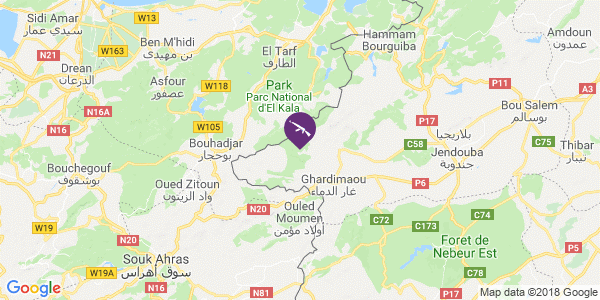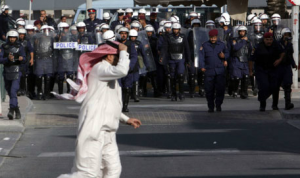Please be advised
According to the Ministry of Interior (MoI), a group of militants killed six National Guardsmen in an ambush targeting two vehicles patrolling the Tunisian-Algerian border near Ain Soltane village, located in Jendouba Governorate’s Ghardimaou District, during the morning hours of July 8.
The militants reportedly detonated an IED against the patrol, which was then followed by gunfire against the National Guardsmen. The assailants reportedly fled the scene following the attack and are still at large.
The attack was later claimed by al-Qaeda in the Islamic Maghreb (AQIM)-affiliated Okba Ibn Nafaa Brigade (OIB). According to their statement, nine National Guardsmen, including an officer, were killed in the attack. The militants seized eight rifles, a handgun, and a machine gun before fleeing the scene of the attack.
According to reports, a man was arrested in Kairouan Governorate for expressing support for the AQIM-OIB claimed attack on July 9.
In addition, members of the security services of Beja staged a protest in front of the National Guard’s headquarters demanding that the Minister of Interior (MoI) support new legislation meant to protect servicemen on July 9.
Assessments & Forecast
The attack is highly notable since it is the largest militant attack on Tunisian soil since March 2016, when Islamic State (IS) militants infiltrated Medenine Governorate’s Ben Guerdane from Libya. This incident highlights the increased risk of militancy near Tunisia’s western borders with Algeria, with the latest attack in the area recorded on May 31, when security forces foiled an AQIM-OIB attack in Kasserine Governorate. Although, AQIM-OIB is known to maintain an operational base along the Tunisian-Algerian border, the majority of its attacks over the past year have been mainly focused in the southwest, namely Kasserine Governorate, rather than in Jendouba, which is located in the northwestern part of the country.
Furthermore, all of these attacks have been of a lower sophistication, mainly involving the use of landmines or shootings. However, the latest attack utilized a relatively more sophisticated modus operandi. The multi-pronged nature of attack highlights the militant group’s resilience to security forces’ ongoing operations in western Tunisia, as well as their fighters’ abilities to regroup in the aftermath of such operations. It is also indicative of their ability to plan and execute coordinated attacks in order to achieve maximum casualties.
The timing of the attack is further significant. It was likely conducted in response to several developments that undermine the group’s interests in the area. These developments include the recent heightened security protocols put in place by Tunisian security forces along the border area in coordination with their Algerian counterparts.
This has led to a decline in the militant group’s abilities to operate along the border area, as witnessed in February, when Tunisian security forces neutralized a leader of AQIM-OIB in Kasserine Governorate based on intelligence from the Algerian intelligence apparatus. The militant had reportedly been sent from Algeria to reorganize the Tunisian affiliate.
Security protocols along the western border have also hindered smuggling operations, which provide militant groups with supplies and revenue, and cement their codependence with local smugglers, as the latter also depends on these operations as a source of income. Mitigating these operations not only damages the militant group’s supply lines, but also erodes their influence over the local population, as its members inevitably seek other sources of income.
Therefore, the attack likely seeks to compel security forces to divert resources away from Kasserine Governorate, which is AQIM-OIB’s primary area of operations in the country, towards Jendouba Governorate. This will overstretch the resources at the disposal of the Tunisian security apparatus, thus allowing militants to operate more freely in the area.
The latest attack follows the June 3 IS-claimed attack against a gas pipeline near Kasserine Governorate’s Sbeitla. In light of the ongoing competition between IS and AQIM over weapons, supplies, and personnel in western Tunisia, it is highly likely that the latest attack was meant to be symbolic in nature. This would project AQIM-OIB as the more prominent Sunni jihadist group in the country, allowing it to attract supporters and recruits at the expense of IS.
FORECAST: In response, the Tunisian Armed Forces (TAF) will launch intensified counter-militancy operations in western Tunisia, including in Jendouba, Kef, and Kasserine governorates. These will likely include increased security patrols as well as artillery shelling against potential militant hideouts in the mountainous regions. Security protocols will also be elevated along the Algerian border in order to prevent militants from crossing into Algeria and evading arrests.
However, this increase in security presence may provide militants with additional targets, leading to further clashes between security personnel and militants. Moreover, the increase in AQIM-OIB activity may prompt IS to heighten operations in the country in the near term. Overall, given the continued entrenchment of militants in western Tunisia’s mountainous areas due to their demonstrated ability to adapt and evolve, further similar sporadic attacks are likely to take place in the coming weeks and months.
Recommendations
Travel to Tunis may continue while adhering to all security precautions regarding militancy and civil unrest. Those operating or residing in Tunisia are advised that we maintain operational capabilities in the country.
Contact us at [email protected] or +44 20-3540-0434 for itinerary and contingency support options.
Those operating or residing in Jendouba District on July 8 should avoid all travel to the Ghardimaou District in light of the anticipated counter-militancy operations following the attack, as well as the likelihood for further clashes in the area over the coming days.
Avoid all travel to the Kasserine, Kef, and Jendouba Governorates, in addition to all border areas, due to jihadist activity and military closures. Furthermore, avoid all travel to within 50 km from the border with Libya, due to the increased threat of attacks originating from Libya targeting Tunisian interests.

